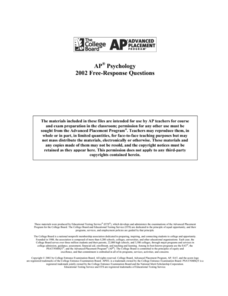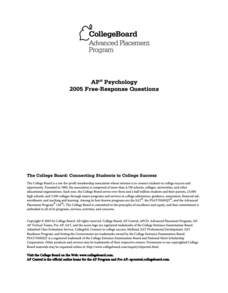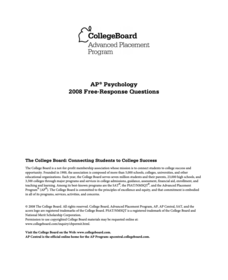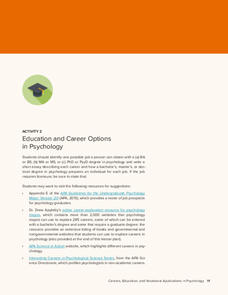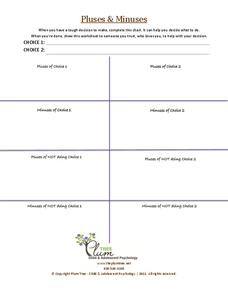Curated OER
The Psychology Teacher's Resource Guide
The activities in a comprehensive teacher's resource guide provides budding psychologists with opportunities to design experiments to study behavior, apply their knowledge of research variables, critique online behavior surveys, and much...
College Board
2007 AP® Psychology Free-Response Questions
It's hard to make friends, and psychology helps explain why. Learners examine a case study where a new member to a club is looking to form friendships. What helps and what can get in the way? A second question asks scholars to examine...
College Board
2002 AP® Psychology Free-Response Questions
A child tells a story of her visit to a fire house. How does her cognitive development impact how she remembers what she saw? Scholars explore a case study and a second prompt about psychological reactions using authentic College Board...
College Board
2003 AP® Psychology Free-Response Questions
Intelligence testing can be a useful tool—but what are its limits? Scholars explore the question, considering issues such as the role of bias, using authentic College Board materials. Learners also examine the psychological factors...
College Board
2005 AP® Psychology Free-Response Questions
How can diagnostic labels help children? Is hypnosis a useful tool or a fraudulent practice? An examination prompt explores controversies in psychology. A second, structured inquiry unpacks perception—and its various influences.
College Board
2008 AP® Psychology Free-Response Questions
Parenting can befuddle new moms and dads, but psychology helps! Learners explain various theories of parenting and child development using a case-study model and materials from College Board. A second practice question asks scholars to...
College Board
2012 AP® Psychology Free-Response Questions
Deciding where to go to college is a tough choice, but psychology helps shed some light on how people make up their minds. Learners consider factors such as ethnocentrism and crystallized intelligence using an exam from College Board. A...
College Board
2013 AP® Psychology Free-Response Questions
A school district is trying to get its learners to read more, but what is the best way to motivate them? A scenario investigates whether the district should use pizza coupons to encourage literacy. Other practice questions from College...
College Board
2014 AP® Psychology Free-Response Questions
A college undergrad has a lackluster first year. Why? A structured prompt from the College Board asks learners to explore various psychological dynamics and how they can affect a young man's freshman experience. A second question asks...
College Board
2015 AP® Psychology Free-Response Questions
To what extent is hyperactivity related to sugary treats at a birthday party, and to what extent is it caused by other factors? What goes into a person's adjustment to a new home? Case studies explore questions like these and offer...
College Board
2016 AP® Psychology Free-Response Questions
What conditions influence a student's performance on a high-stakes test? What is the mental health aftermath of a car accident? Case studies examine these and similar questions. Pupils also sharpen their test-taking skills as they work...
College Board
2017 AP® Psychology Free-Response Questions
How does psychology affect other parts of people's lives? Scholars consider scenarios such as how stress affects a musician's audition or to what extent is a person's eating behavior connected to neurology. Analyzing such questions from...
College Board
2018 AP® Psychology Free-Response Questions
What mental health conditions could affect a student's performance while auditioning for a play? How do stress levels correlate with student absences? Scholars examine case studies to learn more about the mind and mental health or to...
College Board
AP® Psychology Cognition and Language
I can remember what happened five years ago, but I can't recall what I did last week! High school psychology students analyze how memory, cognition, and language impact one another. Hands-on activities, memory exercises, and research...
American Psychological Association
Education and Career Options in Psychology
Psychology class is the perfect time to talk about career options in the field! The resource helps class members research what degree they need to begin different career paths in the field of psychology. Resources include a few websites...
College Board
AP® Psychology: Special Focus - The Brain, the Nervous System, and Behavior
How does the brain send signals to the rest of the body? Scholars research and analyze the functions of the brain and the central nervous system in the human body. Using hands-on activities, reflections, and research, they begin to...
American Psychological Association
A Career in Psychology
Could you have a future therapist in your high school Psychology classroom? Find out by assigning the class to complete an activity where they discover more information about what a career in psychology looks like. Resources they view...
American Psychological Association
Top 20 Principles from Psychology for PreK–12 Creative, Talented, and Gifted Students’ Teaching and Learning
Who knew getting a better grasp on learning and psychology requires understanding only 20 principles? The resource, especially ideal for high school Psychology, discusses 20 important principles that debunk common myths and provide...
American Psychological Association
Using Psychological Perspectives to Answer Questions on Behavior
Perspective is everything when it comes to assessing human behavior. Class members examine a series of statements and identify the perspective represented by each to demonstrate their understanding of different psychological perspectives.
American Psychological Association
Counting Fidgets: Teaching the Complexity of Naturalistic Observation
Why do psychologists conduct experiments in controlled laboratory settings? High schoolers gain an understanding of the importance of controls with an activity that involves naturalistic observations with no imposed controls.
American Psychological Association
Research Ethics
Psychologists designing experiments to research human behavior must consider weighty ethical concerns. Class members act as members of an institutional review board and examine proposals to determine whether included provisions...
American Psychological Association
Sampling or Assignment?
Each discipline has its own vocabulary, terms it uses to identify key concepts and processes. Sample, to psychologists, refers to those people (participants) a researcher is studying, while assignment refers to the treatment conditions...
Autism Speaks
Tips for working with participants with Autism
Everyday life can be overwhelming for a student with autism spectrum disorder. An informative presentation guides teachers through definitions of common attributes associated with autism, as well as ways to meet sensory needs to...
Plum Tree
Pluses and Minuses
Making decisions can be difficult. Here's a form that provides a starting point. After listing two options, individuals are asked to list the pluses and minuses of each.




